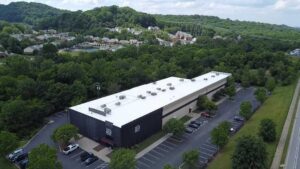
Commercial buildings in Plantersville require sturdy and reliable roofing systems to protect them from the elements. One type of roof commonly used in these applications is the steep slope roof. In this article, we will explore the key features, materials used, importance, installation process, and maintenance of steep slope roofs in commercial buildings. Additionally, we will provide some tips on how to choose the right roofing contractor for your Plantersville commercial property.
Understanding Steep Slope Roofing
Steep slope roofing refers to roofs with a pitch greater than 7:12. These roofs are designed to shed water and keep the building dry. They are typically made up of multiple layers that work together to provide strength and protection. Understanding the key features and materials used in steep slope roofing is essential for making informed decisions about your commercial building’s roof.
When it comes to steep slope roofing, it’s not just about the angle of the roof but also the intricate details that contribute to its functionality and durability. From the underlayment that acts as a waterproof barrier to the flashing that prevents water penetration at vulnerable points, every component plays a crucial role in ensuring the roof’s resilience against the elements. Proper ventilation is another key aspect of steep slope roofing, helping to regulate temperature and moisture levels to prevent issues like mold and rot.
Key Features of Steep Slope Roofs
Steep slope roofs have several key features that make them suitable for commercial buildings in Plantersville. Firstly, the steep pitch allows for efficient water drainage, preventing water from pooling and causing damage to the roof. Additionally, steep slope roofs offer increased wind resistance, reducing the likelihood of damage during severe weather events. Finally, these roofs provide a visually appealing architectural element to the building’s overall design.
Moreover, the steep pitch of these roofs also creates additional usable space within the building’s attic or upper levels. This extra space can be utilized for storage, living areas, or even converted into unique architectural features such as loft spaces or vaulted ceilings. The steep slope can also enhance the overall aesthetic of the building, adding dimension and character to its exterior.
Materials Used in Steep Slope Roofing
Steep slope roofs can be constructed using various materials, each with its own unique advantages. Common materials include asphalt shingles, metal, clay or concrete tiles, and wood shakes. Asphalt shingles are a popular choice due to their affordability, durability, and wide range of designs. Metal roofs offer longevity and energy efficiency, making them a sustainable option. Clay or concrete tiles provide a classic and elegant look, while wood shakes offer a natural and rustic appeal.
Each material used in steep slope roofing comes with specific maintenance requirements and lifespan expectations. Proper installation and regular inspections are essential to ensure the longevity of the roof and prevent issues such as leaks or structural damage. By choosing the right material based on your building’s location, architectural style, and budget, you can enjoy a durable and visually pleasing steep slope roof for years to come.
Importance of Steep Slope Roofing for Commercial Buildings
When it comes to commercial buildings in Plantersville, having a proper steep slope roof is of utmost importance. Let’s explore some key reasons why:
Weather Resistance and Durability
A commercial building’s roof must withstand various weather conditions, including heavy rainfall, windstorms, and extreme temperatures. Steep slope roofs provide excellent weather resistance, ensuring that water is efficiently drained and wind is effectively resisted. Moreover, these roofs are built to last, providing long-term durability, reducing the need for frequent repairs or replacements.
Energy Efficiency and Insulation
Commercial buildings often require significant energy consumption for heating and cooling. Steep slope roofs can contribute to energy efficiency by providing effective insulation. With proper insulation materials and installation, these roofs can help regulate indoor temperatures, reducing the need for excessive heating or cooling and consequently lowering energy costs.
Installation Process of Steep Slope Roofs
Proper installation is crucial for the performance and longevity of steep slope roofs. Let’s take a closer look at the installation process:
Pre-Installation Considerations
Prior to the installation, it is essential to conduct a thorough inspection of the existing roof structure. Any necessary repairs or reinforcements should be addressed to ensure a solid foundation. Additionally, appropriate safety measures should be taken to protect the workers and the building throughout the installation process.
Steps in Installing Steep Slope Roofs
The installation process typically involves the following steps:
- Removal of the existing roofing material and preparation of the roof deck.
- Installation of underlayment, which provides an additional layer of protection against water infiltration.
- Application of the selected roofing material, such as asphalt shingles or metal sheets, according to the manufacturer’s guidelines.
- Proper installation of flashings and ventilation components to ensure proper airflow and prevent moisture buildup.
- Final inspection to check for any potential issues or areas that require further attention.
Maintenance and Repair of Steep Slope Roofs
Maintaining and repairing steep slope roofs is vital for prolonging their lifespan and preventing costly damages. Regular inspections and prompt repairs can help identify and address potential issues before they escalate. Here are some important considerations for maintenance and repairs:
Regular Inspection and Maintenance
Schedule regular inspections by a professional roofing contractor to assess the condition of your steep slope roof. This includes checking for loose or damaged shingles/tiles, roof deck integrity, and the condition of flashings and sealants. Routine maintenance, such as clearing debris and maintaining proper drainage, can also prevent potential problems.
Common Repair Issues and Solutions
Common issues that may require repairs include leaks, damaged or missing shingles/tiles, and deteriorated flashings. It is crucial to promptly address these issues to prevent further damage to the roof, the building, and its contents. Hiring a reputable roofing contractor experienced in steep slope roofing repairs is essential to ensure proper and lasting solutions.
Choosing the Right Roofing Contractor in Plantersville
Selecting a reliable and skilled roofing contractor is crucial to the success of your steep slope roof project. Here are some qualities to look for in a contractor:
Qualities to Look for in a Contractor
Ensure that the contractor possesses the necessary licenses and certifications required by local authorities. A reputable contractor should also have extensive experience in steep slope roofing installations and repairs, as well as a track record of satisfied customers. Additionally, they should offer warranties on their workmanship and be knowledgeable about the various roofing materials available.
Questions to Ask Your Potential Contractor
When interviewing potential roofing contractors, ask about their previous experience with steep slope roofs and the specific materials you are considering. Inquire about their approach to safety precautions during installation and their process for managing any unforeseen challenges that may arise. Request a detailed written estimate and timeline for completion.
By carefully selecting a qualified roofing contractor, you can ensure a successful and reliable steep slope roof installation or repair for your Plantersville commercial building.
In conclusion, steep slope roofing plays a crucial role in protecting commercial buildings in Plantersville. Understanding the key features and materials used in these roofs, as well as their installation and maintenance processes, is essential for making informed decisions. By choosing the right roofing contractor for your project, you can rest assured that your commercial building will have a durable and long-lasting steep slope roof.
Don’t let the unpredictable weather in the Mid-South compromise the integrity of your Plantersville commercial property. Trust Commercial Roofing Rana to provide you with a roofing system that stands the test of time. With our Duro-Last roofing systems, designed to fit your roof perfectly, you can safeguard your employees, customers, and inventory from water damage. Serving Tennessee, Kentucky, Mississippi, and Arkansas since 1983, our team of licensed professionals is committed to delivering top-notch roofing services without cutting corners. Whether you manage an industrial building, a healthcare center, or a shopping complex, Schedule Now with Commercial Roofing Rana to ensure your commercial building’s best line of defense is ready for the next rainstorm.
